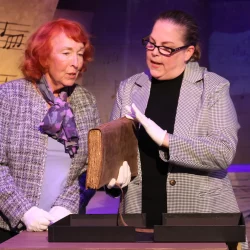(Photo courtesy: Jordan Kubat)
Written by Patrick Chavis
Gem of the Ocean, now playing at South Coast Repertory, is the first play in a 10-play series by August Wilson, covering every decade of the twentieth century. These plays were not written in order, nor was Gem of the Ocean the first play written. Regardless, they all demonstrate Wilson’s talent for getting to the point of serious issues -predominantly African-American issues but a few other topics -while creating dramatic, honest, and entertaining theatre. South Coast Repertory’s rendition of this classic play is a strong production. However, more importantly, its lessons about right, wrong, and truth are still incredibly relevant more than a decade later.
Story:
Gem of the Ocean is set in the house of Aunt Ester, a 285-year-old former slave and spiritual healer still practicing the traditions she brought with her from Africa. A troubled individual named Citizen Barlow inadvertently kills someone, so he sneaks into Ester’s house, hoping to be healed of his massive guilt. Citizen Barlow is invited to stay at the house because he reminds Ester of her late husband. Once inside the house, we meet the inhabitants calling this place home. In many ways, they act like family even though the only blood-related characters are Black Mary (played by Shinelle Azoroh) and Caesar (played by Arnell Powell), brother and sister. The play’s themes center around the idea of what is a true family, what is right, and the struggle African-Americans have dealt with even after the abolition of slavery.

L. Scott Caldwell (Aunt Ester), Hal Landon Jr. (Rutherford Selig),
The willingness to directly confront these heavy themes supports my belief that August Wilson has much in common with Shakespeare. Like Shakespeare, Wilson can handle multiple themes while integrating different genres into the same work and keeping his plays cohesive and honest. What’s so interesting about Gem of the Ocean is the transition from a very grounded story about this loose family of former slaves into an experience of the surreal, mystical world the characters inhabit during their journey to the City of Bones. While the trip to the City of Bones is part of the main storyline, it’s hard to conceptualize what it means until you see them make the journey. In this play, we see African spirituality, which possesses a deep moral history and enables us to understand ourselves and the people around us. Aunt Ester is our guide. She still practices these old traditions but also sees how they can connect to the similar ideas embodied in Christianity. The play shows how not even enslavement can destroy the traditions we carry within us. Also, seeing a character such as Aunt Ester speak wisely about Christian ideals and connect them to African wisdom while discussing the story allows the audience to know a universalism between these philosophies.
The second part of the story, and the main conflict, comes from Arnell Powell’s character, Caesar. He is a law officer willing to use any means necessary to administer “justice.” Even petty crimes can be rightfully resolved with his pistol. When Caesar discovers someone close to him has caused a crime, the dangers of what can happen when we forget who we are comes out in full display.
Acting:
This is one of those plays where there wasn’t a stand-out actor. I could point out whose parts have the most lines or are the most instrumental to the story, but that doesn’t necessarily equal a better performance. In my eyes, each actor nails the dialogue. They keep their lines from sounding too artsy and overcome the issue that plagues so many plays– everyone being out of character because of their unbelievable insightfulness.
Wilson’s play Fences was adapted into a film and received an Oscar Nomination for Best Picture in 2016. Some tout it as Wilson’s greatest work. This may be true. However, if the accurate measure of art is relevancy, then I say –wholeheartedly —Gem of the Ocean is definitely in the running.
October 14 – November 11, 2017
EXCELLENT SHOW!

























































Thank you for the wonderful piece on Grace McLean by Zack Johnston!!